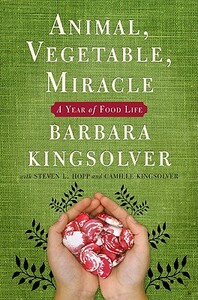You need to sign in or sign up before continuing.
Take a photo of a barcode or cover
I loved this book. I've never read anything by Barbara Kingsolver, but I thought this was a great place to start, and I'm looking forward to seeing what she does with fiction, as her nonfiction prose is lovely. Kingsolver writes about her family's experiment of feeding themselves only what they can grow/raise themselves or buy from neighboring farms for the duration of one year. Kingsolver's voice isn't preachy or condescending; she is simply documenting the travails and triumphs she and her family experience in the course of becoming more self-reliant. This chronicle is by no means a how-to; more of a memoir. Kingsolver's voice is endearing, and she is quite funny.
What I enjoyed most was reading this as a farming and gardening book, but seeing in it solutions to being more environmentally friendly. Nowhere does Kingsolver say she wants to cut down on her plastic consumption or thwart consumerism in general, but these ideals are met just by being self-sustaining: imagine that! Being environmentally conscious and doing things for oneself, like growing food, are complementary. It was quite neat to see that.
Kingsolver's husband and older daughter both contribute small segments to this book, fleshing it out and making it both a factual and eye-opening read, as well as a cookbook of sorts. It's the trifecta: Kingsolver handles the memoir, Hopp the facts to back up the reasons for the experiment, and Camille provides the recipes. What more could you want in one book?
Pick up a copy today, or I'll lend you mine.
What I enjoyed most was reading this as a farming and gardening book, but seeing in it solutions to being more environmentally friendly. Nowhere does Kingsolver say she wants to cut down on her plastic consumption or thwart consumerism in general, but these ideals are met just by being self-sustaining: imagine that! Being environmentally conscious and doing things for oneself, like growing food, are complementary. It was quite neat to see that.
Kingsolver's husband and older daughter both contribute small segments to this book, fleshing it out and making it both a factual and eye-opening read, as well as a cookbook of sorts. It's the trifecta: Kingsolver handles the memoir, Hopp the facts to back up the reasons for the experiment, and Camille provides the recipes. What more could you want in one book?
Pick up a copy today, or I'll lend you mine.
Amazing account of a year living on their own as Kingsolver's family returned to the family homestead (or nearby?). Made me think about eating in-season and why that might be a good idea.
Half of this book is good (the memoir part) half of it is bad (sociopolitical analysis)
I'm not sure why it took me so long to read this - I've long eaten seasonly as much as possible and shop my local farmer's markets as much as my budge and time allow. I learned a lot that I didn't know, was reminded about even more that I did know, and got annoyed by the soapbox that Kingsolver occasionally climbs upon and the metaphorical finger shaking I sometimes read into some sections. Overall, though, it's something everyone should read, especially if you're someone who eats strawberries in January (and thinks that's natural for the northern hemisphere) or don't understand why the dirty 15 should always be purchased organically.
Good basic primer for most Americans wanted to know more about how they interact with their food system. Minus one star for lack of intersectionality/decolonization and minus one star for a truly ignorant and hypocritical chapter on vegetarianism.
This so makes me want to find a way to live off the land, so to speak. Or at least grow a backyard garden and keep dreaming of a someday farm.
I loved this book. Now I will go plant my own garden. And raise my own poultry.
Everyone I've talked to about this book LOVED it, but it felt tired, like it had been done already. Maybe it's because I had been reading Michael Pollan and Plenty while waiting to get Kingsolver's book from the library. I wish she had written the book with an audience of people trying to "eat right" (e.g., buying organic, cooking meals instead of just heating frozen things or going to restaurants). The book was about her experience of trying to eat locally, but she was also advocating that others do that. To that end, more discussion of ways to eat locally if you have limited space for growing food, ideas for how to be a locavore with a limited budget, etc. I did come away from this book with a desire to make my own cheese, though I haven't tried it yet.



